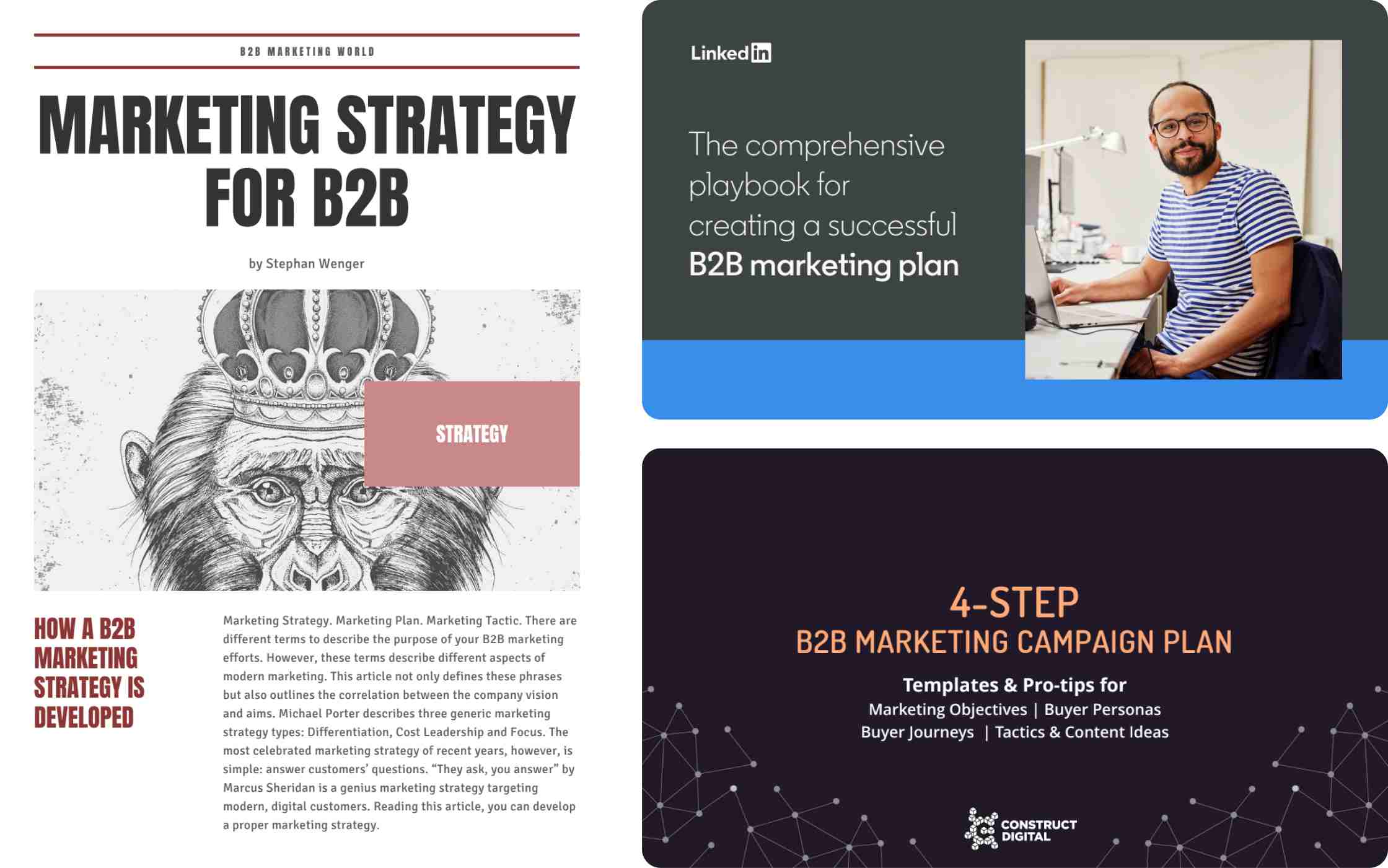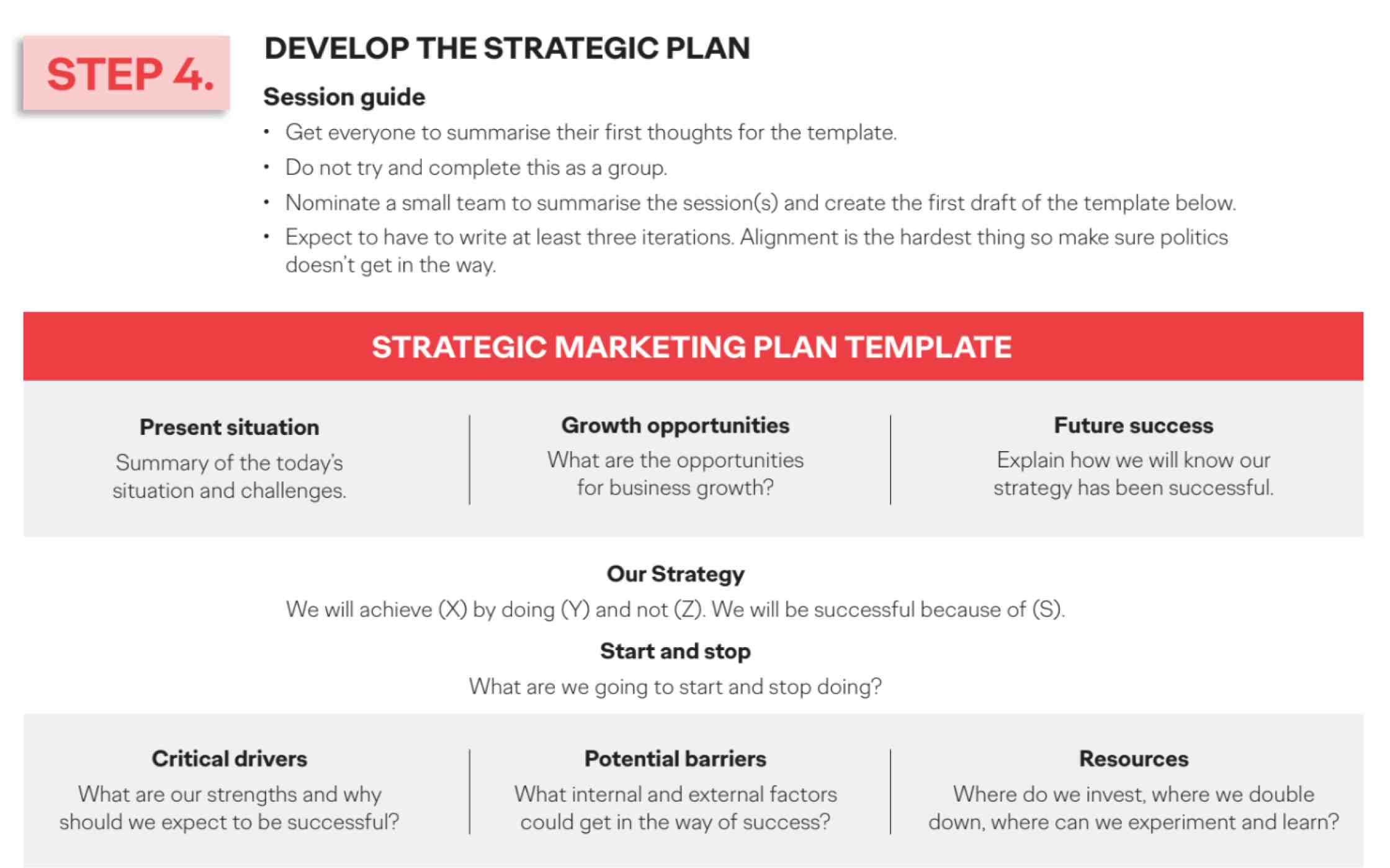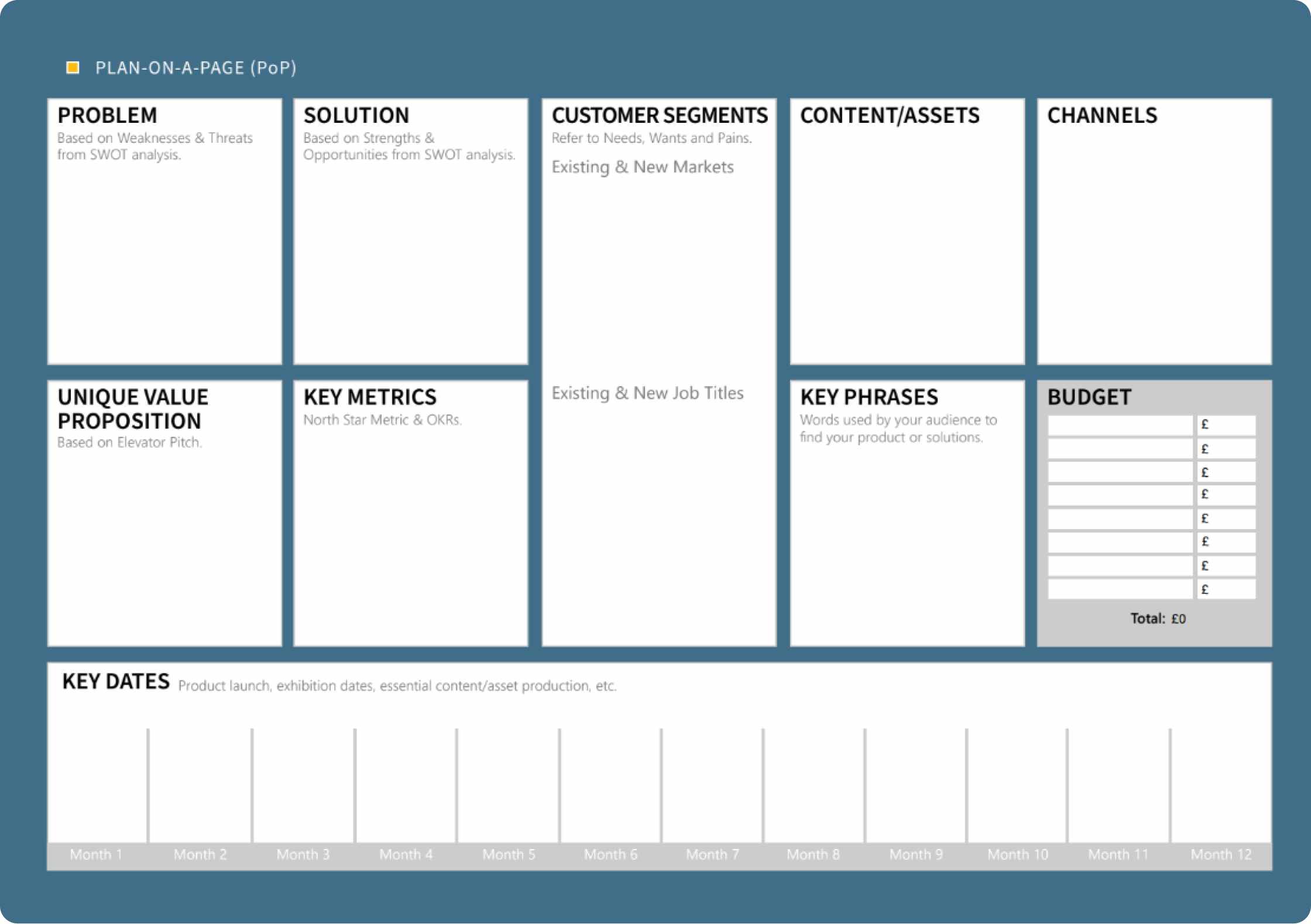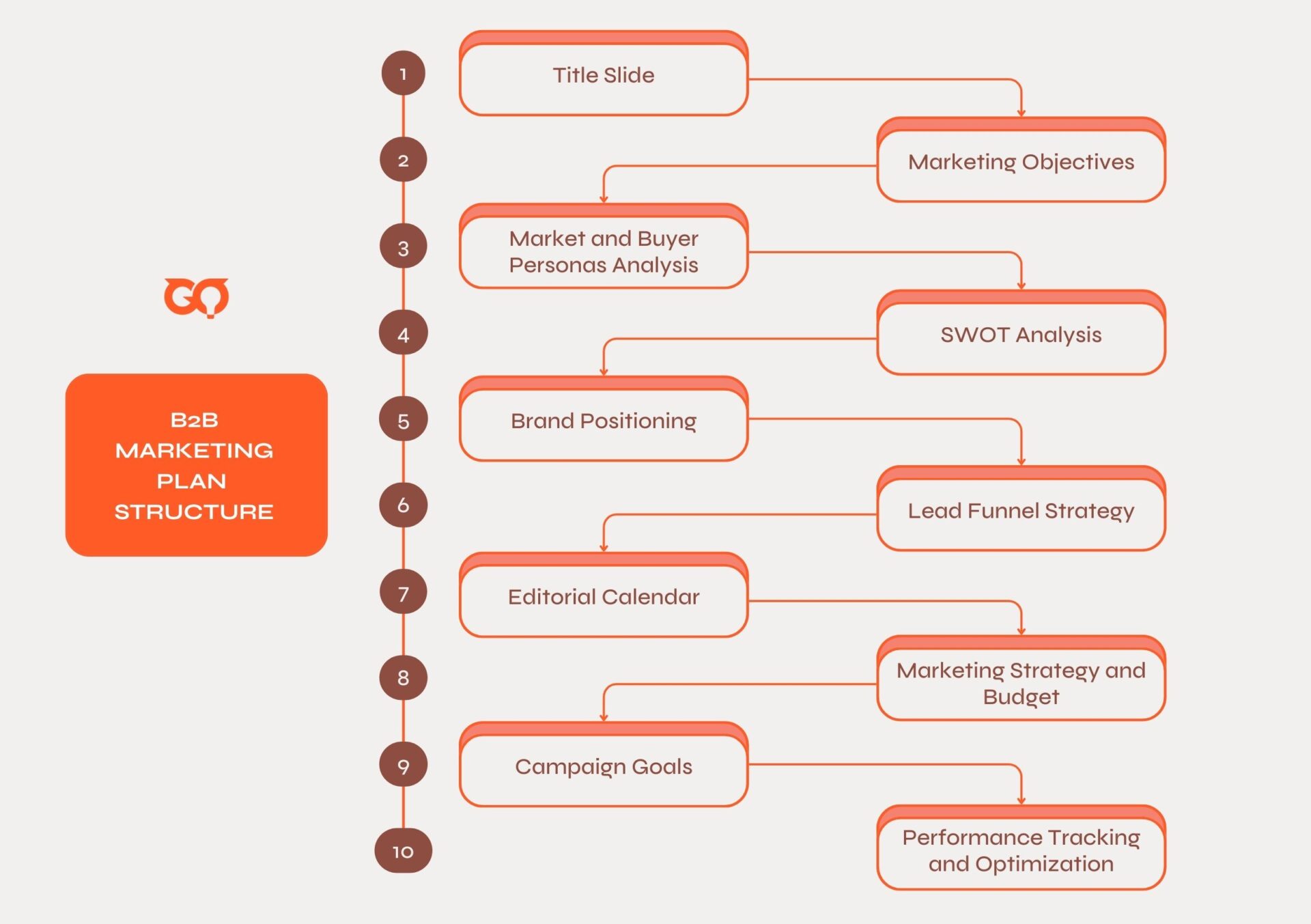A B2B marketing plan template is essential for any business targeting other organizations. Unlike B2C strategies, B2B marketing focuses on organizations, making it essential to tailor approaches to buyer personas, budgets, and goals.
With the right plan, you can optimize resources, analyze your market, and set clear strategies. For instance, companies that operate across seven or more channels can boost their market share by up to 72%. Use our B2B marketing plan template to:
- Dive into market insights
- Create editorial calendars
- Outline effective campaigns.
10+ B2B Marketing Plan Templates to Drive Success
GODI’s B2B Marketing Plan Templates [Exclusives]

For your ease-of-use, Golden Owl Digital offers editable B2B marketing plan templates exclusively for you. Each slide focuses on key elements like market analysis, audience segmentation, objectives, and performance metrics, allowing businesses to present their strategies clearly and concisely.
This bite-sized format is perfect for marketing teams and business leaders who need a flexible, easy-to-digest tool for presentations and quick reviews. It is also ideal for those looking to align marketing efforts with overall business goals in a visually structured manner.
Comprehensive B2B Marketing Plan Templates Collection

In our collections of comprehensive marketing plan templates, we found and collected some of the best, most well-structured, and practical template approaches to building effective marketing strategies.
By seamlessly integrating key elements—such as setting clear objectives, defining buyer personas, mapping the buyer journey, and implementing targeted tactics—this template ensures that every aspect of your marketing efforts is aligned with your overall business goals.
Template to build a B2B marketing plan in ONE week

This B2B Marketing Plan Template is designed to help businesses develop a comprehensive marketing strategy within just one week.
It breaks down the entire process into easy-to-follow steps, ensuring that each critical element—such as defining goals, identifying target personas, performing competitor analysis, and outlining tactical actions—can be completed efficiently.
With clear daily milestones, this template is ideal for businesses and marketing teams looking for a quick, structured approach to building an effective marketing plan.
B2B Marketing Plan-on-a-Page Template

The B2B Marketing Plan Template on a Page offers a streamlined approach for businesses needing to develop a marketing strategy quickly and effectively.
Designed to fit on a single page, this template focuses on key elements like defining your marketing problem, identifying solutions, clarifying your unique value proposition, and determining essential metrics and channels. It’s perfect for businesses looking for flexibility, speed, and efficiency without sacrificing strategic depth.
Pro Tips for Using a B2B Marketing Plan Template Effectively
The commonly cited claim that the brain processes images 60,000 times faster than text is largely inaccurate. Therefore, applying effective strategies such as data visualization can make your B2B marketing plan template much more impactful. Below are some pro tips to help you master planning and presenting your marketing strategy:
| 1. Simplify your slides | 2. Include next steps |
| Focus on one key idea per slide and avoid cluttering with too much text or visuals. Clean slides help your audience stay engaged and understand better. | Always finish with clear actions for your audience to take after the presentation, keeping them engaged and moving forward. |
| 3. Use effective graphics | 4. Tell a story |
| Visuals can make complex data easier to grasp. Use them to present your data in a way that’s clear and visually appealing. | Frame your marketing plan as a journey. Share where your company is now, where it’s headed, and how the plan will help achieve those goals, making the presentation more relatable and memorable. |
How To Create A Persuasive and Effective B2B Marketing Plan

1. Title Slide
Begin by introducing your B2B marketing plan with a clear, engaging title that reflects your company’s goals and industry. Include your logo and tagline for brand consistency and professionalism.
2. Marketing Objectives
Start by outlining your measurable and specific marketing goals. These should align with your overall business strategy and follow the SMART criteria (Specific, Measurable, Achievable, Relevant, and Time-bound) to ensure clarity and track progress effectively.
3. Market and Buyer Personas Analysis
To build a solid foundation, conduct a thorough Market Analysis to understand your industry, competitors, and target market. Follow this with detailed Buyer Personas, where you create profiles of your ideal customers, highlighting their roles, pain points, motivations, and buying behaviors. This will allow you to tailor your marketing messages effectively.
4. SWOT Analysis
Assess your company’s current position using a SWOT analysis to identify your Strengths, Weaknesses, Opportunities, and Threats. This analysis will help you understand internal and external factors that may affect your marketing plan.
5. Brand Positioning
Clearly define your Unique Selling Proposition (USP) and communicate how your brand differentiates itself in the market. Highlight the key value your products or services bring that set you apart from competitors.
6. Lead Funnel Strategy
Develop a Lead Funnel that maps out the customer journey from awareness to conversion. Identify specific tactics for engaging potential clients at each stage, ensuring a smooth transition from lead generation to sales.
7. Editorial Calendar
Create an Editorial Calendar that outlines all content-related activities. This includes publishing schedules for blogs, social media, email campaigns, and other marketing content. Be sure to include dates for important initiatives to keep your strategy on track.
8. Marketing Strategy and Budget
Summarize the overall Marketing Strategy, incorporating key tactics such as content marketing, SEO, social media, email campaigns, and paid advertising. Ensure all approaches align with your business goals. Allocate resources by defining your marketing budget, categorizing expenses like content creation, advertising, and tools. Break down costs by priority, aligning them with your goals and timelines. Make sure the budget reflects the required investment at each stage of the funnel to maximize ROI.
9. Campaign Goals
For each campaign, break down specific goals such as lead generation, increasing brand awareness, or boosting conversions. Establish KPIs to measure success and ensure campaigns align with broader business objectives.
10. Performance Tracking and Optimization
Finally, track your marketing efforts using KPIs like website traffic, conversion rates, and engagement metrics. Regularly review and analyze these performance indicators to adjust and optimize your marketing strategies for continuous improvement.
Bottom Line
In today’s competitive B2B landscape, a clear marketing plan is key to success. Our B2B Marketing Plan Template helps you organize your strategy, budget, and channels effectively. Download now to streamline your efforts and drive your business toward growth.
If you need an effective B2B marketing plan, Go Digital is your trusted partner. We help you optimize time, effort, and business results with tailored strategies that drive measurable success. Let us guide you to maximize your growth potential.







